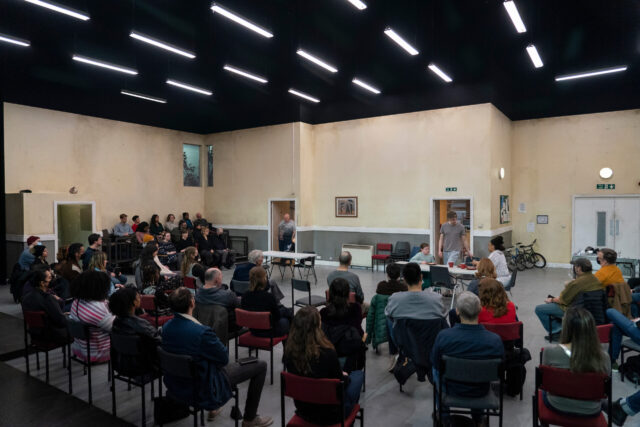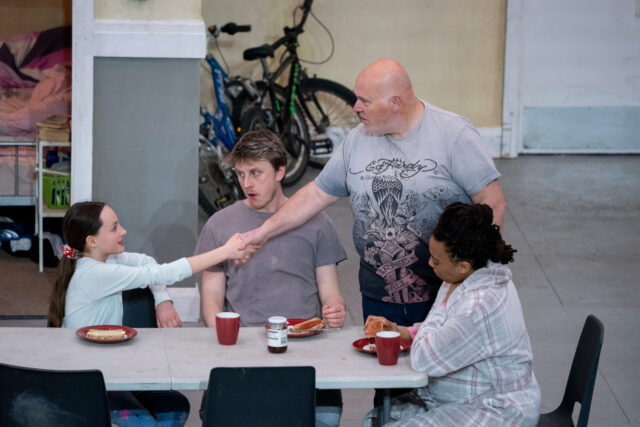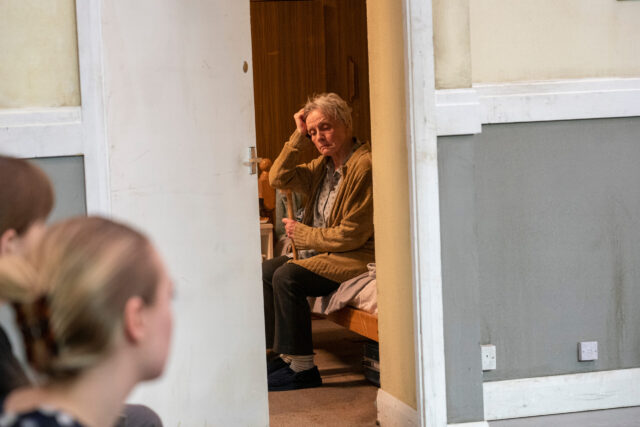
Part of the audience sits onstage at Alexander Zeldin’s Love at Park Ave. Armory (photo by Stephanie Berger Photography/Park Avenue Armory)
LOVE
Park Ave. Armory, Wade Thompson Drill Hall
643 Park Ave. at Sixty-Seventh St.
Monday – Saturday through March 25, $54-$168
www.armoryonpark.org
Park Ave. Armory is home to dazzling theatrical productions and art installations that can happen nowhere else. It is also home to Lenox Hill Neighborhood House’s Women’s Mental Health Shelter. So there is extra relevance to its latest show, writer-director Alexander Zeldin’s staggering, simply titled Love.
Originally presented by the National Theatre in London in 2016, Love takes place in a temporary housing facility in England. Natasha Jenkins’s creaky set features a shared kitchen on one side, a single, filthy bathroom on the other, and a pair of horizontal tables in the middle, behind which are two small apartments. In one, the fiftysomething Colin (Nick Holder) cares for his elderly mother, Barbara (Amelda Brown), who uses a cane and moves excruciatingly slowly. In the other, apprentice electrician Dean (Alex Austin) and his pregnant wife, Emma (Janet Etuk), who is studying to become a massage and wellness therapist, are packed together with Dean’s two children from his previous marriage, eight-year-old Paige (Amelia Finnegan or Grace Willoughby) and fourteen-year-old Jason (Oliver Finnegan).
Also staying at the facility are two lonely, solitary figures, Sudanese refugee Tharwa (Hind Swareldahab), who has been separated from her family, and Adnan (Naby Dakhli), an injured Syrian refugee who has recently been granted asylum.
Approximately ninety audience members are seated on the stage, either in a few rising rows on either side of the set or, mostly, in scattered chairs as if they’re also in the facility. Lighting designer Marc Williams keeps the house lights on for much of the ninety-minute play, implicating everyone in the homeless crisis, with jarring, sudden jolts of instant darkness at the end of some scenes. Josh Anio Grigg’s naturalistic sound and Jenkins’s costumes further immerse the audience in the bleak narrative.

Paige (Amelia Finnegan) shakes hands with new neighbor Colin (Nick Holder) as her parents (Alex Austin and Janet Etuk) look on in Love (photo by Stephanie Berger Photography/Park Avenue Armory)
Dean, Emma, Jason, and Paige are there due to a recent eviction and its aftermath, which embroiled them in bureaucracy. They are further dismayed when they learn Colin and his mother have been in the shelter for twelve months even though the legal limit is six weeks.
“They just cheat you like we’re waiting, fuck, we need somewhere adapted you know our place is like posh flats now,” the ineloquent Colin tells Emma, who responds, “Yeh no obviously I don’t want — the baby — to be born here.” But as time passes and Dean gets buried in red tape, that becomes more and more of a harsh possibility.
On a daily basis, Dean struggles to put any kind of nutritious food on the table, the characters fight over the use of the disgusting toilet, and they each search for the least bit of dignity they can manage. As Christmas approaches, the ever-hopeful and positive Paige practices for her role in the school holiday show, but the bitter and disgusted Jason wants no part of it.

Barbara (Amelda Brown) reflects on her dire situation in Love at Park Ave. Armory (photo by Stephanie Berger Photography/Park Avenue Armory)
Zeldin, whose other works include Beyond Caring and Faith Hope and Charity, did extensive research in developing Love, inspired by John Steinbeck novels; James Agee and Walker Evans’s seminal Let Us Now Praise Famous Men, the 1941 book documenting the lives of three tenant families in the Deep South in words and photos; and the 2014 report “Christmas Families in B&Bs” from the housing charity Shelter, which revealed that more than ninety thousand children would be homeless that holiday season, focusing on twenty families. Zeldin met with them and incorporated their real-life stories into the play through home visits, workshops, and rehearsals. Meanwhile, the latest Shelter report says that 120,000 children are now “waking up in damp storage containers and cramped B&Bs.”
But Love is no mere melodramatic documentary work; instead it is a powerful, harrowing tale of inequality, unfairness, and an incompetent and uncaring government that turns its back on British citizens and refugees despite the laws. The uniformly excellent cast brings to brutal life the demeaning indignity so many unhoused families and individuals suffer through just to have a roof over their head and food on the table. The characters in Love are not asking for handouts or happy to be on the dole; Zeldin presents their disturbing plights with a humane understanding that calls for sociopolitical change without sentimental moralizing.
However, the Christmas angle grows a bit too saccharine, especially when Paige sings “Away in a Manger,” a song about Jesus’ humble beginnings, born in a trough without crib or bed.
Love might be set in England, but it’s all too relevant to what is happening in the United States right now and especially here in New York City, from refugees being bused and flown in from Texas and Florida to gentrification forcing families to leave their longtime communities. Housing insecurity is increasing at alarming rates, and the government can’t agree on any kind of effective action to turn the tide.
Throughout the play, Colin wears an Ed Hardy shirt that proclaims, “Erase All Fears.” It’s going to require a lot more than commercial slogans to institute necessary change.